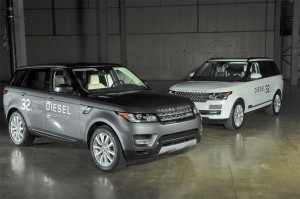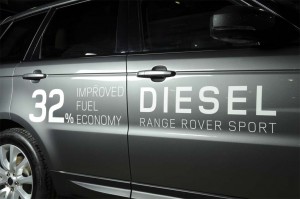Aiming to catch up to key German rivals, British luxury maker Jaguar Land Rover will launch a new line-up of diesels that will eventually be offered across its line-up, the automaker announced during a media preview just before the opening of the 2015 North American International Auto Show.
The new 6-cylinder “oil burners” will first appear in versions of the top-line Range Rover, and are expected to offer as much as a 25% improvement in fuel economy over the comparable gasoline option currently available. They’ll also deliver a significant boost in torque.
Based on the new Ingenium powertrain architecture JLR has developed since spinning off from Ford Motor Co., the diesels will be shared by both luxury brands.
“We intend to roll out fuel-efficient diesel powered vehicles across Jaguar and Land Rover lineups on virtually every model over the next 3 years,” said Joe Eberhardt, the president and CEO of Jaguar Land Rover North America.
“Starting with the Range Rover and Range Rover Sport Td6 Diesel, this Fall, almost every vehicle in the Jaguar and Land Rover line-up will offer an optional diesel powertrain delivering anywhere from 20 to 30% improvement in fuel economy versus the comparable gasoline version,” he added.
That’s expected to include the new Jaguar XE sedan, and the marque’s new F-Pace, its first crossover which made its first appearance at the Sunday night media briefing.
The first two new diesel models will be offered on the company’s Land Rover side – in both the Range Rover Td6 and the smaller Range Rover Sport Td6. The 3.0-liter turbodiesel will turn out 254 horsepower and 440 pound-feet of torque, but also yield an estimated 25 miles per gallon in the EPA Combined cycle.
(Americans want autonomous vehicles…and are willing to pay a premium for them. Click Here for the story.)
Jaguar’s decision to develop a new diesel line-up reflects a broad shift in the luxury market in both Europe and the States. On the other side of the Atlantic, the high-mileage technology currently accounts for nearly half of all new vehicle sales, and the figure runs even higher in some high-line segment, in part reflecting tax incentives.
In the U.S. diesels largely vanished by the late 1990s, but they’ve gained significant momentum over the last five years as new models have been launched, primarily by European importers. Audi, for example, has introduced the technology on a number of key models recently, including the A6, A7 and A8 sedans. Mercedes-Benz offers a wide mix of diesels, and BMW has been growing its product range, as well.
Where available in the U.S., luxury makers have found that diesels are the powertrain option of choice for 15 to 20% of their buyers, while the engines have grown from about 2% of the overall American auto market to three percent since 2009. In the SUV segment, diesels have jumped from 3.1 to 4.6% during the same five-year period, according to industry data.
Higher mileage is one plus. The performance of modern diesels has also been a selling point. Meanwhile, ALG, the former Automotive Leasing Guide, shows that diesels tend to retain a higher value than comparable gasoline models over a four-year period.
(Click Here for a quick guide to the most significant new products planned for the 2015 Detroit Auto Show.)
The downside is that the new JLR diesels will reach market later this year just as fuel prices plunge to their lowest levels in a half-decade. But diesel fuel hasn’t dropped nearly as rapidly as gasoline – and in some regions of the country, such as Michigan, the gap has grown to as much as $1 or more per gallon.
Volkswagen, the largest player in the segment, has seen diesels dip to less than 20% of its overall U.S. sales mix, down from more than 25% early in the year.
“It’s too early to call it a trend,” but there are clear signs of weakness in diesel sales, said Dave Sullivan, senior automotive analyst with AutoPacific, Inc.
How that will impact the launch of the new JLR diesel products remains to be seen.
(Why is the auto industry so optimistic heading into Detroit Auto Show, Click Here to find out.)



Diesels make a lot more sense than any other current form of auto transportation as far as increased mpg is concerned.
The fact that the oil industry Cabal is clearly raping Diesel owners because they trucking industry uses so much Diesel for OTR service, should make the state AGs and Feds jump in and fine these unscrupulous bastards – but they won’t because a lot of PAC money is spent in the right places even at the expense of the entire U.S. economy becoming stagnant. It’s a national disgrace.
One thing you can count on, however, is that oil will not stay at below $50 per barrel. And if you’ve never driven a van or SUV in Europe and felt the difference a modern turbo diesel makes in performance, you will have an eye-opening experience when you try one.